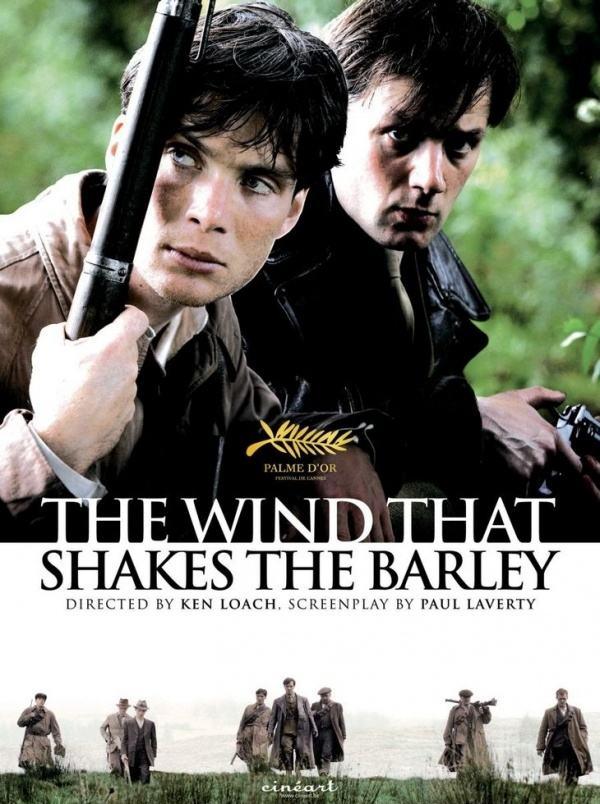Ireland, a small place in the corner of the world, has spawned many literary giants and wonderful stories. Its history and culture have become the source of many films and literary works.
When "The Wind Blows the Wheat Wave" won the Palme d'Or at the Cannes Film Festival in 2006, director Ken Loach said: "Once we dare to tell the truth of history, maybe we dare to tell the truth of the present." "As an Englishman, he made a film that exposed British atrocities and documented the Irish independence movement. The film's name The Wind that Shakes the Barley is derived from the lyrics of an Irish song called "While soft the wind blew down the glen, and shook the golden barley." (The breeze gently blows down the valley, shaking the golden barley).

Barley is one of the main crops in Ireland. The Irish love for the country is very real, potatoes, barley, peat, swamps, grass, are often sung by poets and writers. Unfortunately, there is no golden barley in the film, and the ideals of the revolution are like emerald green fields full of hope, and soldiers walk through the fog without bearing ripe fruit. Britain divides Ireland, just as the two brothers in the film are led to a hostile path by different political choices. This setting is actually a symbol of the real situation in Ireland.
In the course of the Irish independence movement, internal contradictions were more destructive than external contradictions. Charles Stewart Parnell was a prestigious parliamentary leader, but was rebuked by the Catholics for personal problems and lost his leadership. Michael Collins, one of the leaders of the Irish Republican Army who paved the way for Irish independence, was assassinated at the age of 31 when he was considered a traitor by some of the IRA for his compromise with Britain. Over time, southern Ireland is now independent, and Northern Irish have voted to remain in the Commonwealth. The IRA also gradually became a "terrorist organization" that hindered peace. In the movie "Walking with the Devil", Brad Pitt played a IRA soldier who wanted to transport missiles back to Northern Ireland through the United States. But in an age of peace, this is illegal, terrorism and no longer a heroic revolution.
Another noteworthy mention in the film is several great debates. It is said that the Irish love to debate and have a talent for speech and debate. In his short story "Evergreen Day in the Office of the Youth Commissioner", Joyce also described several Irish people getting together to talk about Ireland's past and future at the Evergreen Festival in honor of Parnell. The heated debate in the film is about whether to renounce force for a peace treaty, but no matter what one's choice, that's how it ends.
Requiem for the Croppies
The pockets of our greatcoats full of barley...
No kitchens on the run, no striking camp...
We moved quick and sudden in our own country.
The priest lay behind ditches with the tramp.
A people hardly marching... on the hike...
We found new tactics happening each day:
We'd cut through reins and rider with the pike
And stampede cattle into infantry,
Then retreat through hedges where cavalry must be thrown.
Until... on Vinegar Hill... the final conclave.
Terraced thousands died, shaking scythes at cannon.
The hillside blushed, soaked in our broken wave.
They buried us without shroud or coffin
And in August... the barley grew up out of our grave.
Requiem of the Revolutionaries
The pockets of our thick coats are filled with barley —
When we escaped, we had no kitchen, no tents to dismantle—
We are doing it suddenly and quickly on our own land.
The pastor lay in the gutter with these homeless people.
The group was hardly on the march, but seemed to be traveling with bare hands
We find new tactics in encounters every day:
We pierced the riders with long javelins to cut the reins of the enemy
Drive panicked cattle into enemy positions.
We retreat through a hedge that will surely make the rider fall off his horse.
Until, on the Venegal Highlands, that deadly secret meeting.
Thousands of people died on the mountainside, and we shook our long scythes in the shelling.
The hillside was stained red, and blood soaked the waves of our washdown.
They buried us without coffins and no birthday clothes
In August, barley grew on our graves.
Heaney, who won the Nobel Prize in Literature in 1995, is widely regarded as the best English-language poet in the world today, and his works are comparable to joyce, Yeats, Shaw and many other Irish literary giants. As a Catholic in Predominantly Protestant Northern Ireland, Heaney himself has experienced the upheavals of history. In the 1960s, when the IRA and the Unionists were at odds, he read the poem aloud to a dissident audience, saying: You don't need to love it, you just need to allow it to exist. ”